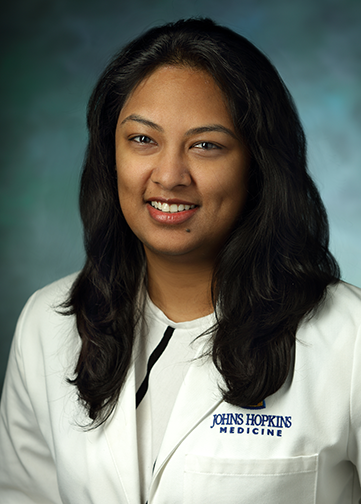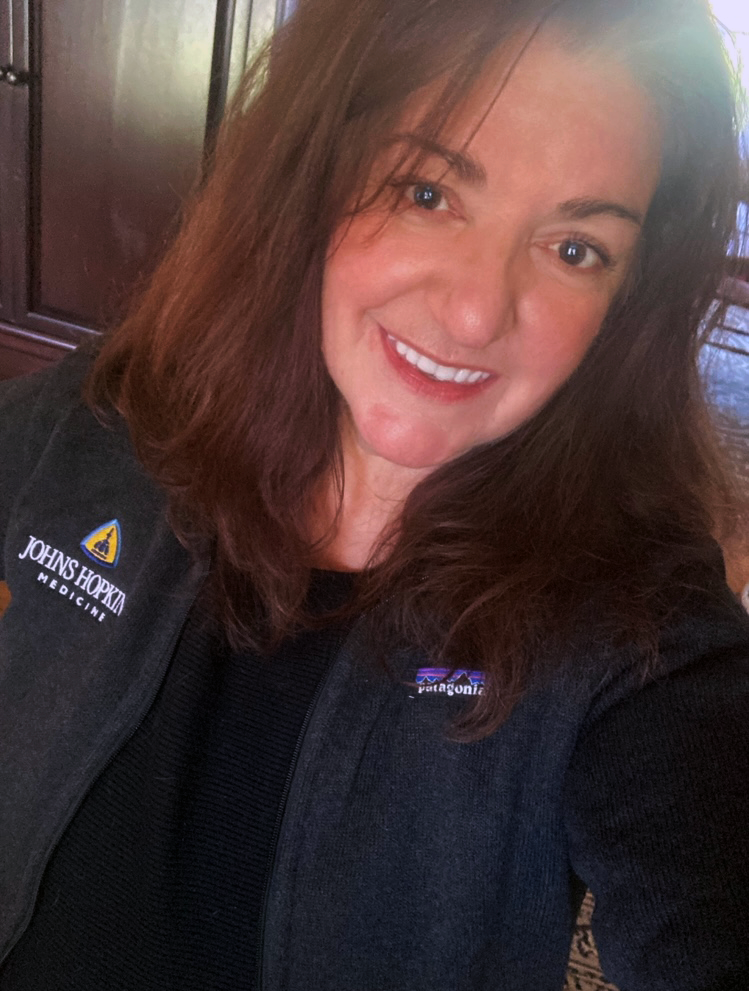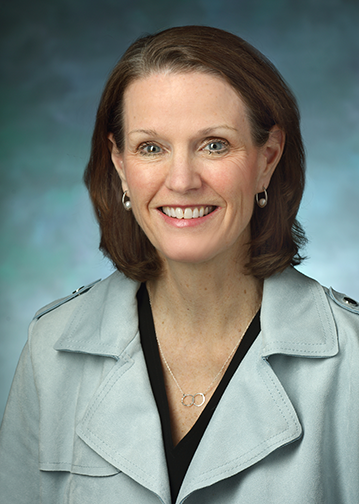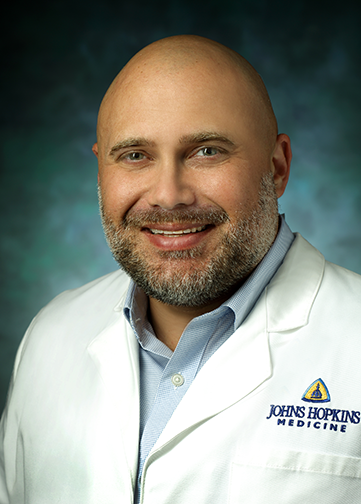The month of November is recognized as National Hospice and Palliative Care Month. Announced in 1978 by then President Jimmy Carter, the month was established to recognize the efforts of those who provide end-of-life care. We'd like to take this opportunity to thank all of our palliative care faculty and staff across The Johns Hopkins Hospital and Johns Hopkins Bayview Medical Center for their dedication and the exemplary care they show our patients.
Check out these spotlights on Kristen Tweedy, Julie Waldfogel and Dr. Corey Tapper, all part of palliative care at JHH. The below are excerpts from the GIM Gauge newsletter highlighting the more of the Palliative Medicine Team at JHH. To learn more about the Bayview Palliative Care Team, check out this video from the American Hospital Association honoring the team with a 2023 Circle of Life Award.
Stay tuned to this post for more spotlights on the JHH Palliative Medicine Team, or subscribe to the GIM Gauge to have them sent to your inbox.
Amy LaMoure, LCSW-C
- Lead Clinical Social Worker for Palliative Medicine
- Joined Johns Hopkins in 2022
- Close to 30 years of experience in hospice/palliative care
How did you become interested in Palliative Medicine? I think I'd always been interested in it. Even in graduate school, I would hear of people who were working in hospice, and that was when it was still evolving as a concept. I think I'd always been driven to working with people who were at the end of life. I was a young social worker when we had a lot of dying AIDS patients. On the medical floors, I was taking care of all those patients and trying to get them support. And honestly, when people would die in the hospital, I would be their bereavement support. I would go to funerals and I would bring them cards. And back then, there just weren't supports in place like that.
What do you enjoy the most about your work in Palliative Medicine? I get so much more out of this than I probably give. What I like about palliative is it’s much more of a process than hospice; that we can get involved with people at the time of a tough diagnosis and stay with them. We all as a team really speak the same language. Yes, we have different personalities, but the language of our work is very similar. More often than not, we're able to be part of people processing what they're going through. It is such a valuable and necessary service. The stuff that I look forward to the most is being available to be in those really hard places. My hope is it's going to be better because I (or someone on our team) am there to support and clarify.
What do you wish more people knew about Hospice and Palliative Medicine?
My wish list for non-palliative providers:
- See the involvement of our team as essential, rather than optional, and normalize the involvement of palliative any time someone is dealing with a serious disease
- Stop seeing palliative care for your patients as “they’re not ready for that"
- Stop being fearful of what palliative providers will go in and do
We're not the “doom and gloom people.” We're people who actually bring a lot of light to medical conversations by spending time getting to know who these people are and what they value. I love when I walk in a room and a family is like, “Oh, thank God,” like we're the cavalry coming in.
Can you share any important lessons you've learned along the way? There’s always more to the story than the patient you see in the bed. Real empathy comes from getting to know a person’s story. Take the time to simply ask about a person – it just take two minutes. It doesn't take the time that people think it's going to take.
Ivy Akid, MD, MPH, HMDC
 "Growing up, I envisioned a physician as a diagnostician and a compassionate 'healer.' A doctor is a scientist compounding an immense volume of knowledge, providing evidence-based treatments for ailments, while also being able to form a connection with patients and their loved ones.
"Growing up, I envisioned a physician as a diagnostician and a compassionate 'healer.' A doctor is a scientist compounding an immense volume of knowledge, providing evidence-based treatments for ailments, while also being able to form a connection with patients and their loved ones.
Throughout my career, I focused on building my medical knowledge while honing my communication skills and leading with empathy. During my geriatrics fellowship, I was interested in learning about the systems-level training required to navigate transitions of care for patients. I witnessed the changes within the healthcare system patients deal with as they age and how this time of great need was impacting some of our most vulnerable patients. This interest in protecting our most vulnerable patients and learning systems-level techniques to guide them, drew me towards the field of Palliative Medicine.
I find joy and meaning through connecting with others, be that my patients, my colleagues or the learners I am working with.
It is a privilege to work in a community where I am surrounded by great minds with a growth mindset and get to collaborate with others from our multi-disciplinary teams who bring a slightly different worldview to help us all enhance our patient's quality of life.
My patients taught me that in life, we are limited in what we can control and what we cannot control.
We strive to focus on the things that we can. I have learned that the seemingly small things (support of a friend, moments of joy) are really the big things in life. We also often have more in common than we realize. Communication breaks down barriers and through this, we build deeper connections which allow us to understand one another without judgement and without prejudice. These skills and lessons are pivotal for a palliative doctor."
Dianne McCann, Senior Medical Office Coordinator
 How did you become interested in Palliative Medicine?
How did you become interested in Palliative Medicine?
I became interested in palliative medicine through my own family’s experience. Not too long ago, I lost my stepfather, brother, and sister-in-law within two years. Each of them had a long illness. When you know the time you have with someone is being cut short, you are especially aware of his or her quality of life, and you want to make the best of that time. The support of a medical team that can provide comfort and assistance is invaluable. I saw first-hand the importance of good palliative care.
What do you enjoy the most about your work in Palliative Medicine?
I am not a doctor nor a nurse. So, what I enjoy most is when I know I am able to contribute to the well-being of a patient or his or her family in some way, whether it be by making sure a patient has access to prescriptions, or scheduling timely, more convenient appointments, or relaying messages to providers. Everything counts.
Can you share any important lessons you've learned along the way?
At the end of the work day, I like to make a short list of what needs to be done the following day. But it’s funny how often the days don’t turn out the way you expect them to. A big lesson I’ve learned is to be ready to change gears. I manage the various palliative clinic schedules and, at any time, with patients entering the hospital or feeling ill, my planned schedules can come apart. I often have to reschedule to try to make the best of the patients’ and providers’ time. It doesn’t always work out, but it’s very rewarding when things do come together.
Final Thoughts: We see patients who are being treated for life-threatening or life-shortening conditions. I’m sure many of the people I talk to who have received their diagnosis just had one of the worst days of their lives. That’s what makes it all the more poignant when I say that I am impressed on a daily basis with the care and compassion of the medical professionals I work with. And it makes me glad I can help.
Marc Epstein, MSN, ANP-BC, ACHPN
- Palliative Care Nurse Practitioner since 2011
- Joined Johns Hopkins in August 2021
- Works inpatient and outpatient on the Palliative consult service
Palliative Medicine truly teaches you to live life to the fullest. You never know when something's going to happen. Take advantage of opportunities that come your way. If you are unhappy, make a change – no one’s going to change it for you.
You don't want to say, “I should have done that. I should have ended this terrible relationship. I should have gone on that vacation while there was that opportunity and while I had my health.” Seeing what I see every day, I encourage you to truly just seize the day and to live your most authentic life because there's no do over.
How did you become interested in Palliative Medicine?
I did an ethics fellowship at the University of Chicago, which really opened my eyes to a lot of the issues we deal with in Palliative Care. At the time, there was no Palliative Medicine consult service where I worked. People were approaching the end of life and no one was talking to them about the big picture or that they could go home – that they could be comfortable there if that's what their wishes were.
I started having those conversations and this pushed me to become a nurse practitioner. I went back to school and when I finished my degree, I was thinking, “Let me just interview with a Palliative Care group; see if I like it.” And when I met with them, I realized these were my people.
What do you enjoy the most about your work in Palliative Medicine?
It's absolutely, 100%, the patient care that motivates me, and it's the way I can be involved with patients at such a vulnerable place in their life and build their trust. Working in Palliative Medicine and caring for patients is a gift. So many people are like, “Oh, how could you do this? It takes a special person. Oh, you must be an angel.” But really, I feel like I'm the one who's getting the reward.
I'm helping people live their best life possible. If they’re acutely ill or nearing the end of life, I want to help make the landing as gentle as possible. I'm there to help them cross that bridge. It’s such a tender spot to be in, and it's such a privilege to impart information to patients and families and deliver the hardest news in a way they can find meaningful and therapeutic.
Important lessons learned along the way?
- You will stumble: Have confidence in yourself if you expect others to have confidence in you.
- Everyone has a story: The person we see in a bed was once as independent and vibrant as the rest of us. They’re not just another sick person in bed.
- You're at an intersection in a person's life: When guiding someone through the end of their life, remember you didn't create the situation they're in; you're also not going to cause their death.
- Have good clinical knowledge: Learn how to translate medical information in a way that’s understandable to families.
- Compartmentalization is essential: I always have the next getaway planned and enjoy spending time with loved ones. I also weightlift 5x/week and this helps level my mind.


